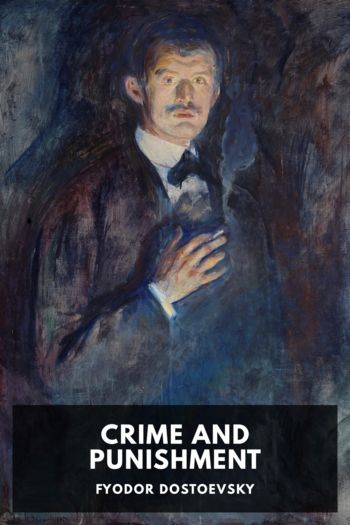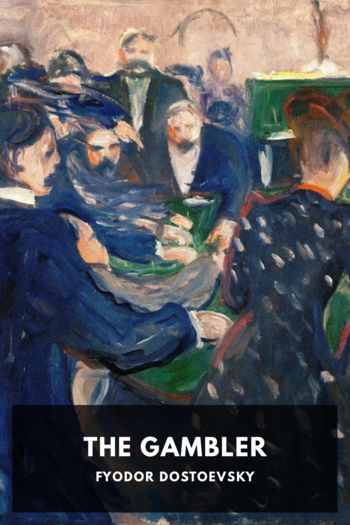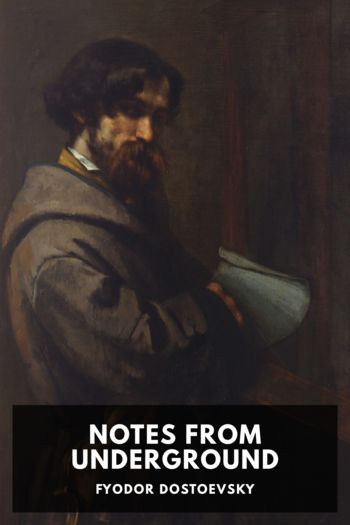Crime and Punishment by Fyodor Dostoevsky (love novels in english TXT) 📕

- Author: Fyodor Dostoevsky
Book online «Crime and Punishment by Fyodor Dostoevsky (love novels in english TXT) 📕». Author Fyodor Dostoevsky
“But you say she is hideous?” observed the officer.
“Yes, she is so dark-skinned and looks like a soldier dressed up, but you know she is not at all hideous. She has such a good-natured face and eyes. Strikingly so. And the proof of it is that lots of people are attracted by her. She is such a soft, gentle creature, ready to put up with anything, always willing, willing to do anything. And her smile is really very sweet.”
“You seem to find her attractive yourself,” laughed the officer.
“From her queerness. No, I’ll tell you what. I could kill that damned old woman and make off with her money, I assure you, without the faintest conscience-prick,” the student added with warmth. The officer laughed again while Raskolnikov shuddered. How strange it was!
“Listen, I want to ask you a serious question,” the student said hotly. “I was joking of course, but look here; on one side we have a stupid, senseless, worthless, spiteful, ailing, horrid old woman, not simply useless but doing actual mischief, who has not an idea what she is living for herself, and who will die in a day or two in any case. You understand? You understand?”
“Yes, yes, I understand,” answered the officer, watching his excited companion attentively.
“Well, listen then. On the other side, fresh young lives thrown away for want of help and by thousands, on every side! A hundred thousand good deeds could be done and helped, on that old woman’s money which will be buried in a monastery! Hundreds, thousands perhaps, might be set on the right path; dozens of families saved from destitution, from ruin, from vice, from the Lock hospitals—and all with her money. Kill her, take her money and with the help of it devote oneself to the service of humanity and the good of all. What do you think, would not one tiny crime be wiped out by thousands of good deeds? For one life thousands would be saved from corruption and decay. One death, and a hundred lives in exchange—it’s simple arithmetic! Besides, what value has the life of that sickly, stupid, ill-natured old woman in the balance of existence! No more than the life of a louse, of a black-beetle, less in fact because the old woman is doing harm. She is wearing out the lives of others; the other day she bit Lizaveta’s finger out of spite; it almost had to be amputated.”
“Of course she does not deserve to live,” remarked the officer, “but there it is, it’s nature.”
“Oh, well, brother, but we have to correct and direct nature, and, but for that, we should drown in an ocean of prejudice. But for that, there would never have been a single great man. They talk of duty, conscience—I don’t want to say anything against duty and conscience;—but the point is, what do we mean by them? Stay, I have another question to ask you. Listen!”
“No, you stay, I’ll ask you a question. Listen!”
“Well?”
“You are talking and speechifying away, but tell me, would you kill the old woman yourself?”
“Of course not! I was only arguing the justice of it. … It’s nothing to do with me. …”
“But I think, if you would not do it yourself, there’s no justice about it. … Let us have another game.”
Raskolnikov was violently agitated. Of course, it was all ordinary youthful talk and thought, such as he had often heard before in different forms and on different themes. But why had he happened to hear such a discussion and such ideas at the very moment when his own brain was just conceiving … the very same ideas? And why, just at the moment when he had brought away the embryo of his idea from the old woman had he dropped at once upon a conversation about her? This coincidence always seemed strange to him. This trivial talk in a tavern had an immense influence on him in his later action; as though there had really been in it something preordained, some guiding hint. …
On returning from the Hay Market he flung himself on the sofa and sat for a whole hour without stirring. Meanwhile it got dark; he had no candle and, indeed, it did not occur to him to light up. He could never recollect whether he had been thinking about anything at that time. At last he was conscious of his former fever and shivering, and he realised with relief that he could lie down on the sofa. Soon heavy, leaden sleep came over him, as it were crushing him.
He slept an extraordinarily long time and without dreaming. Nastasya, coming into his room at ten o’clock the next morning, had difficulty in rousing him. She brought him in tea and bread. The tea was again the second brew and again in her own teapot.
“My goodness, how he sleeps!” she cried indignantly. “And he is always asleep.”
He got up with an effort. His head ached, he stood up, took a turn in his garret and sank back on the sofa again.
“Going to sleep again,” cried Nastasya. “Are you ill, eh?”
He made no reply.
“Do you want some tea?”
“Afterwards,” he said with an effort, closing his eyes again and turning to the wall.
Nastasya stood over him.
“Perhaps he really is ill,” she said, turned and went out. She came in again at two o’clock with soup. He was lying as before. The tea stood untouched. Nastasya felt positively offended and began wrathfully rousing him.
“Why are you lying like a log?” she shouted, looking at him with repulsion.
He got up, and sat down again, but said nothing and stared at the floor.
“Are you ill





Comments (0)